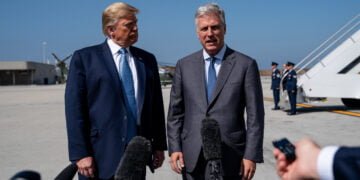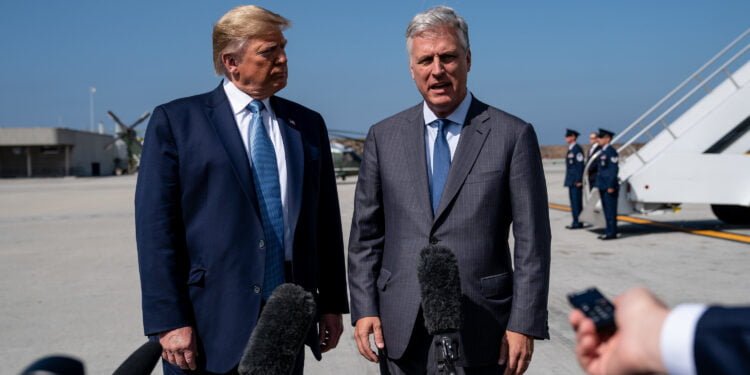Robert C. O’Brien, a prominent figure in U.S. foreign policy, has a distinguished career spanning various roles in government and law. He served as a U.S. Representative to the 60th session of the UN General Assembly, nominated by President George W. Bush and unanimously confirmed by the U.S. Senate. O’Brien’s expertise extends to cultural affairs, having been a presidentially appointed member of the U.S. Cultural Property Advisory Committee from 2008-2011. His military background includes service as a Major in the Judge Advocate General’s Corps of the U.S. Army Reserve. O’Brien’s legal career is equally impressive, co-founding Larson O’Brien LLP, a nationally recognized litigation boutique in Los Angeles. He holds a J.D. from U.C. Berkeley School of Law and a B.A. in political science from UCLA.
O’Brien’s Role in the Trump Administration
National Security Advisor Position
Robert C. O’Brien served as the 27th U.S. National Security Advisor from 2019 to 2021, appointed by President Trump to succeed John Bolton. In this role, O’Brien was Trump’s principal advisor on foreign policy and national security affairs. He took office on September 18, 2019, and was expected to play a significant role in a potential second Trump administration.
Key Policy Decisions
During his tenure, O’Brien was involved in several crucial policy decisions. He accompanied Vice President Mike Pence to negotiate a ceasefire between Turkey and Kurdish forces in Syria. O’Brien defended the intelligence used to justify the drone strike against Qasem Soleimani in January 2020. He also played a role in early deliberations about the U.S. response to the COVID-19 pandemic, advising Trump to halt travel from Europe in March 2020.
Influence on Foreign Policy
O’Brien’s influence on foreign policy was notable, particularly regarding China. He aligned with hardliners on China policy, threatening sanctions over Hong Kong’s national security law and criticizing China’s actions in the South China Sea. O’Brien oversaw the brokering of the Abraham Accords, normalizing relations between Israel and several Arab nations. He also focused on defense and industrial base issues, advocating for a 355-ship Navy and visiting shipyards and defense plants.
Recent Statements and Publications
Foreign Affairs Article
Robert C. O’Brien’s recent essay in Foreign Affairs has garnered significant attention, potentially serving as a blueprint for future Republican foreign policy. The article focuses heavily on Asia, reflecting shifting geopolitical realities and emphasizing China as the primary peer competitor for the U.S. O’Brien’s essay outlines the perceived shortcomings of the Biden administration and proposes strategies for a potential second Trump term.
CBS Face the Nation Interview
In a recent CBS Face the Nation interview, O’Brien discussed his Foreign Affairs essay and addressed questions about Trump’s previous stance on U.S. troops in South Korea and Japan. He also commented on the growing alliance between Russia, Iran, China, and North Korea, as well as Trump’s campaign statements regarding Ukraine.
Key Policy Proposals
O’Brien advocates for a 355-ship navy to counter China’s military growth. He criticizes the Biden administration’s border security policies and suggests viewing the immigration and fentanyl crises beyond domestic law enforcement. O’Brien also proposes resuming nuclear weapons production and testing to ensure reliability and safety in response to China’s nuclear arsenal expansion.
Potential Impact on Future US Policy
Implications for US-China Relations
O’Brien’s proposals suggest a shift towards a more confrontational stance with China. He advocates for building up the armed forces of Indonesia, the Philippines, and Vietnam, offering them grants, loans, and weapons transfers similar to those provided to Israel. This approach aims to create a stronger network of allies to counter Chinese influence in the region.
Military Strategy Shifts
The proposed changes include deploying the entire Marine Corps to the Pacific and moving an aircraft carrier from the Atlantic to the Pacific. O’Brien emphasizes the need for a “peace through strength” approach in dealing with China and Russia, as outlined in the National Security and National Defense Strategies.
Nuclear Policy Changes
O’Brien suggests resuming nuclear weapons production and testing to ensure reliability and safety in response to China’s nuclear arsenal expansion. This controversial proposal could potentially escalate nuclear tensions and impact international arms control efforts.
Conclusion
Robert C. O’Brien’s foreign policy vision may serve as a template for future Republican administrations, drawing comparisons to influential historical strategies like George F. Kennan’s ‘X’ article and the Wolfowitz Doctrine. O’Brien’s emphasis on “peace through strength” aligns with his goal of bolstering American leadership globally. His approach, focusing on a strong military presence in the Pacific and economic decoupling from China, has sparked significant debate. However, his aggressive stance towards China raises questions about the potential for escalating tensions in East Asia. As O’Brien continues to shape the foreign policy discourse, his ideas will likely influence the debate for years to come, regardless of his future political role.










Discussion about this post